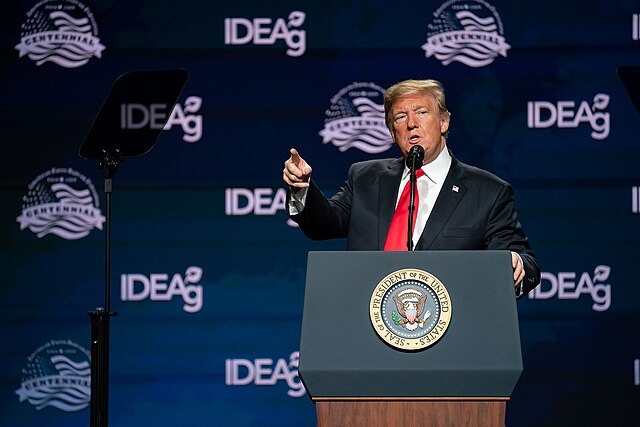Last week’s Super Tuesday primary results confirmed many existing narratives surrounding the 2024 presidential election, with a few surprises thrown into the mix.
Former President Donald Trump all but secured his Republican nomination, winning nearly every state and surpassing 1,000 total delegates. In a speech at his estate in Mar-a-Lago, Trump touted his administration’s accomplishments while criticizing President Joe Biden’s policies. The former president praised Tuesday’s win, saying “They tell me… pundits and otherwise, that there has never been anything so conclusive. This has been an amazing night.”
Any mention of former Ambassador to the United Nations Nikki Haley, who suspended her bid after a series of defeats, was absent from Trump’s remarks. Haley’s only win came from the state of Vermont, bringing her to a total of 94 delegates. Despite the unsuccessful performance, the runner-up still showed gratitude for her campaign’s efforts.
“I said I wanted Americans to have their voices heard. I have done that. I have no regrets, and although I will no longer be a candidate, I will not stop using my voice for the things I believe in,” Haley said in a speech after suspending her campaign.
Haley additionally congratulated Trump on his win before stressing the importance of a Republican presidential victory in November. Despite the praise, Haley did not officially endorse Trump.
On the Democratic side, Biden confirmed expectations with a massive win. Long-shot candidate Dean Phillips, a former U.S. representative from Minnesota, dropped out of the race after failing to substantially challenge the president. Author Marianne Williamson earned a small percentage of the vote in various states despite no longer being an active candidate.
One of the biggest surprises of the night came from the U.S. territory of American Samoa, where Jason Palmer, a largely unknown entrepreneur, defeated Biden. Palmer’s victory is the second election in a row where American Samoa has been taken by a trailing candidate, with former New York City Mayor Michael Bloomberg claiming it in 2020.
One narrative that dominated news headlines for Democrats was the prevalence of votes for “uncommitted” across the country. The option, sometimes labeled “no preference” or “none of these candidates,” was available on most ballots as an alternative choice.
“Uncommitted” received nearly 20% of the vote in Minnesota and grabbed 13% in Michigan, the latter translating to over 100,000 votes. Hawaii’s caucus resulted in a massive 29% of the vote going to the ballot option. While many factors, such as concerns regarding the 81-year-old incumbent’s age likely contributed to the sizable margin, the most prominent reason for the vote can be attributed to disapproval of Biden’s handling of the Israel-Hamas War.
In Michigan, the “uncommitted” vote was the result of a coordinated effort led by a group of Muslim and Arab American organizers. The movement to vote uncommitted, which saw similar endeavors in other states, was organized to persuade Biden to call for a permanent ceasefire in the Gaza Strip. A Biden campaign official acknowledged the movement in Michigan ahead of Tuesday’s primary but still affirmed that the result in the state indicated “his core group of supporters are still behind him.”
While the large number of “uncommitted” voters doesn’t directly indicate how the president will fare in November’s general election, it raises many questions regarding support for Biden in swing states and among Democratic and Independent voters.
jlaforg2@ramapo.edu
Featured photo courtesy of Tia Dufour, Wikimedia






